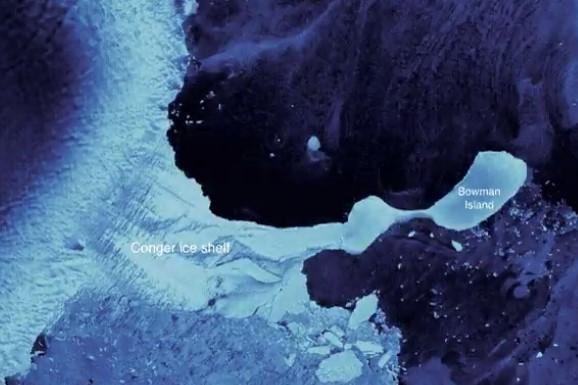Satellite images show the Conger ice shelf in Antarctica has collapsed, scientists report. Photo courtesy of
Stef Lhermitte/Twitter
March 25 (UPI) -- The Conger ice shelf in Antarctica has collapsed, according to satellite data, in what scientists say is the most significant collapse there in nearly 20 years.
While the ice shelf is relatively small -- it is roughly the size of Rome -- Dr. Catherine Colello Walker said the event, which came in a week with unusually high temperatures, could be a harbinger for more collapses to come.
"It won't have huge effects most likely, but it's a sign of what might be coming," said Walker, an Earth and planetary scientist for NASA and the Woods Hole Oceanographic Institution.
"It is one of the most significant collapse events anywhere in Antarctica since the early 2000s when the Larson B ice shelf disintegrated," Walker told the Guardian.
Ice shelves permanently float and don't add to rising sea levels. However, if entire ice shelves collapse, glacial ice on land can be released into oceans and that can raise sea levels, according to scientists.
Temperatures increased with an "atmospheric river" event, where a stream of warm air rolls over a region -- in this case, raising the temperature 30 degrees higher than normal for this time of year.
"We need to better understand how the warm period has influenced melt along this whole sector of Antarctica," Andrew Mackintosh, head of the school of Earth, atmosphere and the environment at Monash University, told Cnet.
University of Minnesota geologist Peter Neff says the collapse of even a small ice shelf in Antarctica is surprising.
"We still treat East Antarctica like this massive, high, dry, cold and immovable ice cube," Neff said.
According to Neff, satellite data from the Copernicus Sentinel-1 mission showed the ice shelf collapse started between March 5 and 7.
"This collapse, especially if tied to the extreme heat brought by the mid-March atmospheric event, will drive additional research into these processes in the region," Neff said.
More than a third of Antarctica's ice shelves will be at risk of collapse if global temperatures reach 4 degrees celsius above preindustrial levels, according scientists.
In December, scientists warned that an ice shelf holding back a crucial Antarctic glacier could break up within five years. If that happens it could greatly increase the rate of sea level rise.















